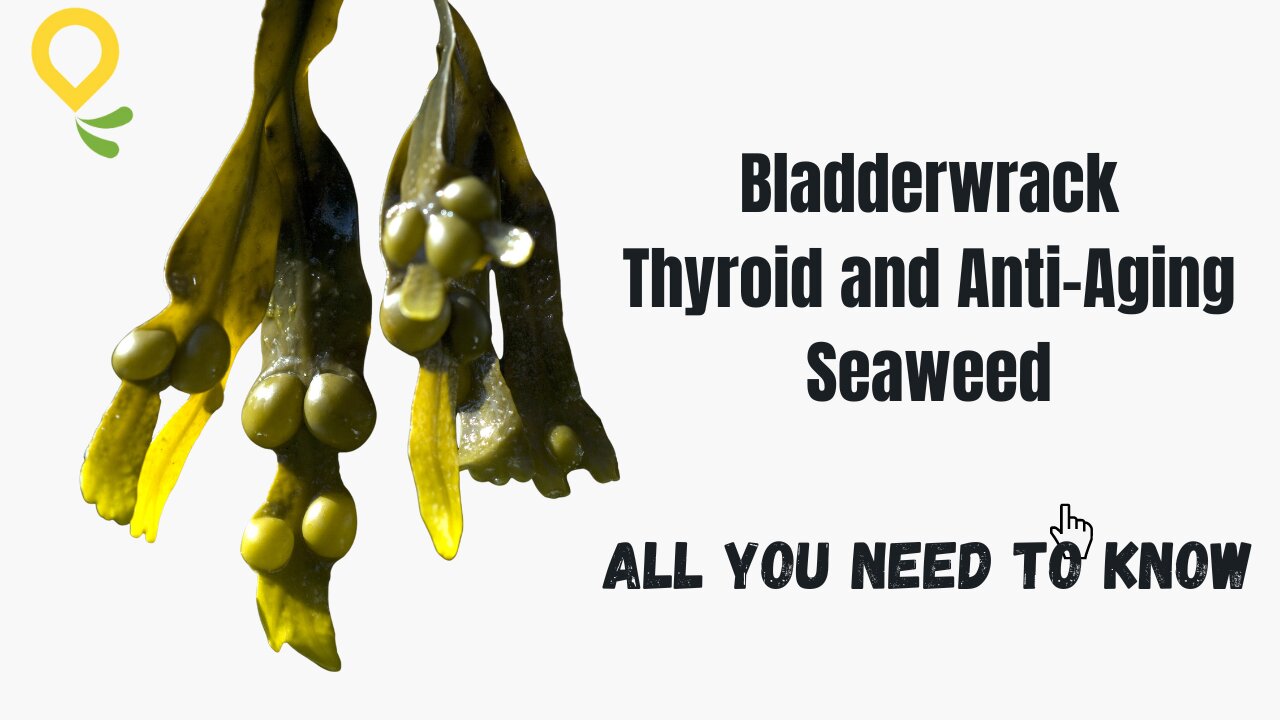Premium Only Content

Bladderwrack - Thyroid and Anti-Aging Seaweed
Bladderwrack is a type of brown seaweed that’s used in traditional medicine. It’s also known by other names such as rockweed, red fucus and black tang.
Traditional uses over the centuries include the treatment of conditions such as joint pain, iodine deficiency, obesity, aging skin, digestive issues, urinary tract infection, and thyroid dysfunction, including both hyperthyroidism, hypothyroidism, as well as goiter development.
This video will tell you all you need to know about bladderwrack.
Bladderwrack nutrition
For hundreds of years, many cultures have consumed seaweed as part of their regular diet.
Bladderwrack is a type of seaweed that’s rich in vitamins and minerals, such as calcium, iodine, magnesium, potassium, sodium, zinc, and vitamins A and C.
Bladderwrack is high in fiber, which helps to support a healthy gut.
Thyroid function
Bladderwrack contains high levels of iodine, a trace element that supports thyroid health by producing the thyroid hormones triiodothyronine (T3) and thyroxine (T4). These hormones help regulate your metabolism and support proper growth and neurological development.
Iodine deficiency can lead to low T3 and T4 levels and may ultimately cause health complications, such as hypothyroidism which is a condition that is characterized by symptoms such as weight gain, fatigue, dry skin, and increased sensitivity to the cold.
Hypothyroidism is mostly related to an autoimmune disease known as Hashimoto’s thyroiditis.
Although being a good dietary source of iodine which is a mineral that can support thyroid health — taking bladderwrack supplements or eating large amounts of it may provide excessive amounts of iodine. So, consult with your doctor first.
People with thyroid disorders, such as hyperthyroidism or hypothyroidism, should practice caution, due to the fact that it could lead to worsened symptoms, especially if iodine deficiency was not the root cause of the disorder itself.
To be safe, it’s best to speak with your healthcare provider before taking bladderwrack supplements.
Anti-inflammatory effects
Bladderwrack is rich in antioxidants and vitamins A and C.
Free radicals are harmful compounds that can damage cells and lead to chronic disease and premature aging.
Some test-tube and animal studies have concluded that brown algae like bladderwrack offer anti-inflammatory results and may also help reduce tumor growth, blood sugar levels, and the risk of heart disease.
In one large study involving over 86,000 people had shown a 12% decreased risk of heart disease with the daily consumption of seaweed.
Skin health
Bladderwrack has also been used as a topical treatment for skin issues, such as skin aging, cellulite, and burns.
Early research has shown that the antioxidants in bladderwrack promote collagen synthesis in the skin, which may help improve the look of cellulite, increase skin healing, and delay premature skin aging.
In a two-phase study, applying bladderwrack extract to skin samples had led to a 228% increase in collagen production.
In the second phase, a mixture of bladderwrack extract and other algae extracts was tested on human upper leg skin for a period of 3 months. The algae mixture led to a significant decrease in cellulite appearance and fat thickness.
Other older studies using topical gels containing 1% bladderwrack extract were associated with an increase in collagen production.
Also, bladderwrack’s high antioxidant content has been linked to less collagen and elastin breakdown when applied to human skin samples. Preventing the breakdown of collagen and elastin is important for the appearance of youthful skin.
Precautions and side effects
Though generally recognized as safe, bladderwrack may have some unwanted side effects.
Applying bladderwrack to the skin is likely safe. However, avoid applying it to open wounds and cuts, and discontinue use if you experience any adverse reactions, such as a skin rash.
Like other edible seaweeds, bladderwrack is safe to eat when consumed in small amounts. However, it contains high levels of iodine, salt, and heavy metals, which can pose health risks, especially when taken in supplement form.
Along with those with thyroid disorders, bladderwrack may be unsafe for women who are pregnant or breastfeeding.
Moreover, bladderwrack may interfere with other medications and herbal products, such as blood thinners, antiarrhythmic medications, thyroid medications, St. John’s Wort, ginkgo biloba, and valerian root.
Be sure to consult your healthcare provider before taking bladderwrack.
-
 26:38
26:38
DeVory Darkins
1 day ago $6.39 earnedNewsom suffers CRUSHING LOSS after SCOTUS ruling hands Trump HISTORIC WIN
7.79K67 -
 11:23
11:23
Nikko Ortiz
1 day agoArmy Tik Tok Fails Go Hard
52.5K7 -
 2:27:44
2:27:44
Side Scrollers Podcast
18 hours agoSilksong is “TRANS CODED” + YouTube GASLIGHTS Creators + Asmongold Stops Streaming | Side Scrollers
8.31K18 -
 16:08
16:08
GritsGG
10 hours agoRank 1 Warzone Player VS Stream Snipers & a Cheater!
7.54K1 -
 1:39:16
1:39:16
The HotSeat
14 hours ago👉 STOP Blaming Each Other — Look at the Media!
24.7K25 -
 22:34
22:34
The Pascal Show
10 hours ago $0.98 earnedFEDERAL CHARGES?! Iryna Zarutska's Attacker Gets Hit With Federal Charges After Fatal Train Attack
7.57K10 -
 LIVE
LIVE
Lofi Girl
2 years agoSynthwave Radio 🌌 - beats to chill/game to
187 watching -
 13:05
13:05
Mike Rowe
4 days agoIs College DEAD? Inside America’s #1 Trade School | Sheree Utash From #448 | The Way I Heard It
78.6K27 -
 3:01:13
3:01:13
FreshandFit
6 hours agoAyesha Curry Never Wanted Steph Curry
65.8K11 -
 23:28
23:28
DeVory Darkins
11 hours ago $11.49 earnedTrump official ANNIHILATES Democrats in heated debate as CNN gets caught sympathizing with criminals
26K73